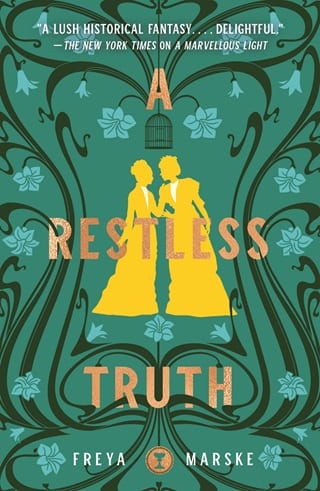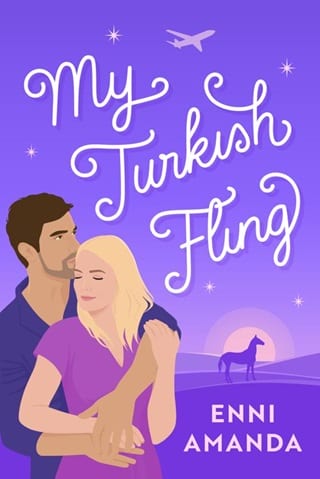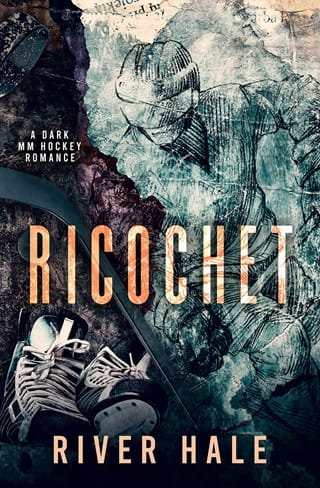Chapter 12
12
The question, Hawthorn pointed out before their growing army of counter-conspirators broke up to prepare for dinner, was this: why had someone imbued his whisky with a sleeping charm in the first place?
Was it simply a matter of getting him out of the way, given that he was a well-known magician— ex -magician—now publicly linked with Maud and presumably, in the eyes of Mrs. Navenby’s murderer, recruited to her side? Had they expected him to take a sip of whisky that night and then sleep through the entire voyage?
“Why not kill me, in that case?” Hawthorn said. “If they’ve shown willingness to do so.”
“A dead earl’s son in the prime of his life might attract a lot more attention than a dead old woman,” said Maud.
“And an unbreakable sleep wouldn’t?” Violet pointed out.
“The point being,” said Hawthorn, “someone got into my suite and left me an unwelcome surprise. Who’s to say they haven’t done the same to you?”
So Violet found herself accompanying Maud back to her own cabin, after having demonstrated a general detection charm until Hawthorn was satisfied it should catch most kinds of charms and imbued objects. She hoped she had enough magic left. She’d grown used to gauging the limits of her power using the spells that she’d practiced over and over in the Penumbra, keeping some spare for self-protection and small comforts in her boardinghouse before she collapsed into sleep a few hours before dawn.
In Maud and Mrs. Navenby’s cabin she kept the physical parameters of the detection strict: to the bounds of the two connected rooms, and no further.
“Will it sparkle?” Maud asked. “Like the whisky?”
“It should be visible, if there’s anything,” said Violet. “I didn’t have a lot to put into it, so it might fade quickly. Search fast.”
Maud nodded. “I’ll take my room; you take this one.”
Violet’s brisk circuit of the space was halted almost immediately at an exclamation from Maud.
“Here! Is this something?”
A line no wider than a hair ribbon glowed acid green on the floor, like a trip wire laid across the doorway leading from the main room into the smaller one.
“It’s something,” Violet agreed. “ Maud! ”
Maud retrieved her hand, with a guilty look, from where she’d waved her fingers in the air above the green line. “If the whole doorway was the trap, wouldn’t all of it be green? Besides, I feel perfectly well.”
“And what if it’s something delayed?” Violet’s heart had given a hard, unpleasant pound. She knelt to inspect the line, which was already fainter in hue as her spell’s effect began to fade. The carpet glistened oddly and the scent of peppermint rose to her nose. “I think this is an imbued oil.”
“Like the olive oil you used to wake Ross?” Maud picked up her skirt and took a firm step over the green line. Violet’s heart gave another curious thud, then subsided, as if to tell her that there was no use to it reacting every time Maud Blyth did something rash.
“Be careful,” she said anyway.
“If it’s in the oil, perhaps I need to touch it. Besides, all of my clothes are in here, and I need to dress for dinner.”
“ Dinner! ” came a loud, harsh voice from behind Violet. She jumped what felt like a foot, and nearly fell herself onto the green line.
“Bloody hell,” she gasped.
“Bloody hell.”
“Oh, Dorian,” said Maud. “You still have fruit in your cage, you silly bird, I can see it from here. And I refilled your water bowl.”
“ Dinner. Hello, shut up . Cheat! Go away. ”
“Charming vocabulary,” said Violet.
“Maybe I should give him to the—oh!” Maud beamed. “I wonder if Helen Bernard would like him, as a gift?”
Violet cradled a more everyday negation than the one that Hawthorn had shown her for the whisky. This was the kind cast to cause a blackout at the end of an act, when several different light charms or illusions were going at once. She was pleasantly surprised when the green line winked into nothing. Though now she did feel the worn-thin sensation, like coming to the end of a lungful of air, that meant she didn’t have a lot of magic left.
They quickly searched the rest of the space, in case more than one surprise had been left, but nothing else showed up. Maud even searched her luggage. Her shoulders relaxed when she tugged a slim, black-covered volume, like a cheap notebook, from the depths of the trunk.
“What’s that?” Violet asked.
“Nothing. Or rather—it’s Robin’s. I can’t lose it.” Maud replaced it hastily. “Shall I have to ask you to cast that detection-spell every time I return to the cabin, now? I hate the idea of wasting your magic like that.”
So did Violet. She looked down at the gleam of oil—now harmless—along the door line.
“I’ve an idea,” she said.
Several times she’d been with her friend Thom to his family’s workshop in Queens, a poky space accessed through a mirror in a drugstore. His parents wore rings of polished coral—hard to come by, but ideal for imbuement. The workshop smelled of dried plants and pure organic oils: rose and olive, sesame and mint. And also the sweet, intense fragrance of Indian sandalwood, which took beautifully to charms for warding. Thom used it in minuscule amounts to keep moths and rats from the Penumbra’s costume storage.
Violet had smelled sandalwood earlier that day. That was why the memory was close to hand.
“What is it?”
“I can’t promise it’ll work, but there’s something I can try, if I can get my hands on some sandalwood oil from the Turkish baths. Perhaps Mr. Ross can steal it for us.”
Violet left Maud to dress for dinner and returned to her own stateroom to do the same. There, the detection charm showed nothing except the imbuements that Violet knew existed on her own belongings.
The dining saloon was a little over half-full, and Mr. Bernard was already applying himself with a single-minded air to his wine when Violet sat down. Hawthorn was bookended by Rose and Mrs. Bernard, who were fluttering attention upon him.
“Good evening, Mr. Chapman!” called Maud.
The young cotton-mill man was strolling hesitantly between tables and had slowed to a hopeful crawl as he passed them. He returned Maud’s smile.
“Good evening, Miss Cutler. I trust you’re enjoying the voyage so far.”
“Very much. We’ve a seat free, if you’d care to join us. Unless you’re waiting on someone else, ma’am?” she appealed to Mrs. Bernard. “No? There, that’s settled.”
“Very kind of you,” said Chapman, and sat.
The string quartet was playing unobtrusively in the corner near the grand piano. Violet ordered the duck and watched Mr. Chapman attempt to impress Maud. At least he was asking her questions, instead of assuming that his own opinion would be fascinating to any woman. And he’d shown no sign of being turned off by Maud’s burgeoning involvement in scandal; though perhaps, given he was travelling unattached, the gossip machine of the ship simply hadn’t reached him.
Violet made an attempt at conversation with Rose, was bored to tears by the first insipid answer, and gave up. The duck was dark and tender beneath a port-wine sauce. The wine was even better. And Mrs. Bernard, champion entertainer that she was, was back singing her favourite tune. The chorus went: Has Your Lordship Ever Considered Marriage?
“I’m afraid I’ve never been tempted,” said Hawthorn. “After all, what are the benefits for a man in my position?”
“You know,” said Violet, “I’m sure I heard a song on that very topic once. What was it called? The Benefits of—oh, something.”
Mr. Bernard coughed on a mouthful of veal and turned a shade redder. Violet applied herself angelically to her buttered parsnips. The song’s title was “The Benefits of the Marriage Bed.” It had eight verses. The last two had been banned from public performance in even the most disreputable of establishments; at the Penumbra they were pulled out only at rooftop parties, when they were drunkenly shouted into the noise of the El rattling overhead.
“Companionship,” said Mrs. Bernard. “Surely.”
“I prefer my peace and quiet,” said Hawthorn.
“Someone to manage your household for you.”
“I am self-managing, ma’am.” An ironic bow of his head. “And I employ an excellent housekeeper.”
“What about children, my lord?” Violet asked sweetly. “The continuation of your ancient line? Don’t you want a young future earl of your own, to dandle on your knee?”
“I have cousins,” said Hawthorn, exactly as one flattened a fly with a newspaper.
“Well, that’s stumped me.” An imp of spiteful mischief had been knocked to Violet’s surface by this topic of conversation. She let her pine-wood ring click against the gilt edge of her dinner plate, then ran her fingertips down her neck and toyed with the trim at the neckline of her gown, which dipped generously low. “I can’t think of any other reasons one might want to marry.”
“What about love?”
Maud had spoken quietly, but it carried. The table recentred itself around her lifted chin and the way she left the word dangling there like a gauntlet for Hawthorn to pick up.
“Exactly, Miss Cutler,” said Mrs. Bernard. “But perhaps Lord Hawthorn thinks the concept old-fashioned.”
“Modern, I’d say,” said Hawthorn. “Or no more than a pretty fantasy.”
“A fairy tale?” said Maud at once. “I know a few fairy tales with truth in them. But I happen to disagree with you entirely, my lord, and I have evidence in my favour.”
“Oh, are you in love, Miss Cutler?” said Hawthorn, in his most coolly disinterested tones.
Maud’s cheeks flamed. She took a long gulp of her wine. Mr. Chapman and both Bernard sisters now looked at Lord Hawthorn with dislike. To anyone assuming that Hawthorn had extended his favours of debauchment to Maud the previous night, this would look like a cruel and humiliating set-down.
Maud said heatedly, “No. I’m not. But I know what it looks like, companionship with love. I’ve seen it. I’ve lived in the same house with it.”
“How lucky you were,” said that imp in Violet, “to have such paragons for parents.”
Maud looked at her. Maud, who didn’t like lying, and who Violet knew had not been thinking of her parents when she spoke.
“My parents did have a happy marriage. Their personalities and principles were in harmony.” Maud paused. “It’s just a pity those personalities and principles were so bloody awful .”
Helen Bernard gave a startled hiccup of laughter. Everyone else looked politely blank.
Maud swayed in her seat. She pressed a hand to her flushed forehead and let out a startled giggle, a beat after Helen’s.
“Let’s talk of something else, Miss Cutler,” said Mr. Chapman, with a hard look at Hawthorn. “You were telling me about when Mrs. Navenby took you to Central Park, and—”
“Maud,” said Violet. “Are you all right?”
“A little warm.” Maud giggled again. “No, I’m fine, really.” Her eyes looked odd. How much wine had she had? How much wine was she accustomed to having?
“You do look very flushed,” Violet said. “I think you need some sea air. Lord Hawthorn, will you assist us?”
Hawthorn levelled a long, considering look at Maud and thankfully didn’t fall back into his usual rudeness. He pushed back his chair.
“You needn’t trouble yourself, my lord,” said Chapman with another look of dislike. “I’m sure I can escort Miss Cutler—”
Hawthorn ignored him. He scooped a firm arm under Maud’s and helped her to stand. She swayed away from him.
“I’m well,” she said peevishly. Then, as she swayed back—“Oh. No, perhaps I’m not. Is the ship going through a storm? A—what do they call it? A swell?”
“Miss Cutler, we’re taking you out on deck,” said Hawthorn. “Ladies, enjoy your evening. Chapman. Bernard.”
Mr. Bernard waved a spoon at them as they left. Chapman was still half out of his chair. Violet cast a longing look at the dessert trolley as she followed Hawthorn and Maud out onto the promenade that ran alongside the dining saloon.
The ship was not going through a storm, or a swell. The air was breathtakingly crisp, and quiet after the music and chatter of indoors. Early stars shone on satin-blue patches of sky between the masking clouds, and the dark expanse of the sea melted into an uncertain horizon.
Hawthorn steered Maud to the railing and placed her hands on it until they gripped. His starched shirtfront was very pale against the black of his dinner tailcoat and his dark hair.
“If you fall overboard, I will let you swim to Southampton,” he said.
“I never learned to swim,” Maud told him.
Hawthorn sighed. “How do you feel?”
“ Never become a physician.” Maud giggled tiredly. “I haven’t told you the story of what Mrs. Navenby said when we were in Central Park, have I?”
“She’s only drunk,” said Violet.
Hawthorn’s mouth was set. “Are you sure?”
Violet thought suddenly of the green line, and Maud waving her hand across it.
“No. But I can’t manage another of those negations. I’m drained for the day.”
Hawthorn swore. He took Maud by the shoulder and slapped her cheek, not hard.
“Miss Blyth,” he said. “Maud. Look at me. At least we can try emptying your stomach.”
“Oh, that. I can do that. I did it when I was ten, to ruin one of Mother’s parties.” A grin broke out on Maud’s face. “All over the tiger-skin rug they’d just laid down in the parlour. She was furious.”
Maud demonstrated her skills over the edge of the ship. No doubt that piece of railing had played host to plenty of people emptying their guts. Violet shivered. She’d not bothered with a wrap, and the wind nipped at her bare upper arms.
“Ugh.” Maud made a fastidious face when she was finished. She took Hawthorn’s proffered handkerchief and wiped her mouth on the monogrammed J.F.C.A . “That was strong wine. I feel so silly for drinking it that fast. I’m sorry I ruined your dinners.”
“Nothing was ruined. Hawthorn was probably an inch away from insulting one of the Bernard girls to their face,” said Violet. “I like being a scandal, but I’d rather we didn’t drive away everyone else on this ship. It’s only the second night, after all.”
“And it’s not over yet,” said Hawthorn. “Or am I expected to take delivery of your shipment of pornography myself?”
 Fullepub
Fullepub 



